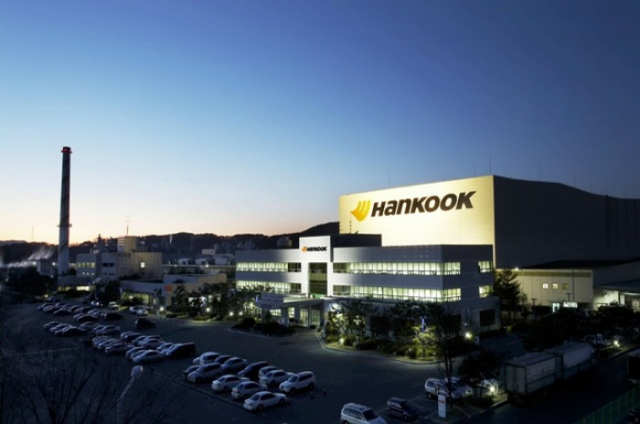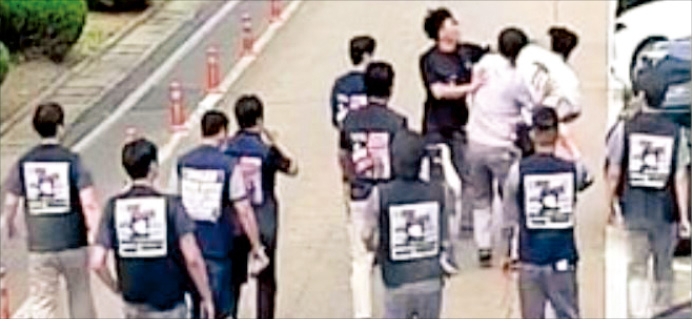Labor union
Hankook Tire sees increasing threat from combative labor union's demands
The tire manufacturer faced its first strike in 59 years last November. The latest incident comes just seven months since that protest
By Jun 22, 2022 (Gmt+09:00)
3
Min read
Most Read
LG Chem to sell water filter business to Glenwood PE for $692 million


Kyobo Life poised to buy Japan’s SBI Group-owned savings bank


KT&G eyes overseas M&A after rejecting activist fund's offer


StockX in merger talks with Naver’s online reseller Kream


Mirae Asset to be named Korea Post’s core real estate fund operator



As a string of sporadic labor union strikes enters its third week, the risk of supply disruption has spread to an unlikely victim – Hankook Tire & Technology.
A division of the Korean Confederation of Trade Union (KCTU) at the tire manufacturer forcibly ceased operations at Hankook Tire's Daejeon factory Sunday morning, according to industry insiders’ accounts.
When the managers questioned the forced disruption, members of the militant labor union allegedly kicked their shins and even threw their fists at the managers. The plant resumed its operations later that afternoon.

The company, for its part, plans to demand a police inquiry into the incident and seek relevant legal repercussions.
Even though the Cargo Truckers Solidarity division of KCTU ended its strike last week after just over a week, other labor union protests are in the forecast.
The KCTU, widely considered to be combative, will hold its large-scale protest in downtown Seoul next Saturday.
The protest aims to raise the hourly minimum wage by 19% on-year to 10,890 won ($8.36).
The national labor union argues the steep hike is in line with surging inflation.
GROWING RISK
The latest blow to South Korea’s No. 1 tire manufacturer sent shockwaves throughout the industry.
Until late last year, Hankook had not experienced a labor union protest for 59 years.
On November 24, 2021, Hankook Tire labor union members began an unprecedented strike that lasted 24 days. With the catalyst, many union members switched their association from the Federation of Korea Trade Union (FKTU) to the KCTU.
The strike halted the operations and Hyundai Motor Co. had to switch the tires manufacturer of its certain models from Hankook to Kumho Tire.
Fast forward to this year, the more belligerent labor union now has more members than its milder counterpart.

A TRIPLE WHAMMY
South Korean companies are not only facing global concerns of high inflation and the economic downturn but also increasing demands from their workers.
The Korea Enterprises Federation, for its part, explained: “The corporate sector is hit by a triple whammy of higher costs, higher interest rates, and an unfavorable exchange rate that leads to a plunge in production, consumption, and investment. The labor union is taking their demands too far to the point of being absurd."
In related news, Hyundai Steel Co.’s labor union has been occupying the president's office of Hyundai Steel's Dangjin steel mill in South Chungcheong Province.
Car makers Hyundai Motor Co. and GM Korea Co. are also facing strong demands for wage hikes from their respective labor unions.
Experts say the Yoon Suk-yeol administration’s response to the summertime strikes will set the tone for the remaining five years he’ll be in office.
An industry insider told The Korea Economic Daily that policy reforms, such as the adoption of a blanket ban on the takeover of business sites and allowing replacement workers in times of strikes, are imperative “to level the playing field that is currently skewed in favor of the union members.”
Updated with details on Nov. 2021 strike and changes that ensued
Write to Il-Gue Kim at black0419@hankyung.com
Jee Abbey Lee edited this article.
More to Read
-
 Supply chainS.Korean trucker strike enters 3rd day, targets Samsung’s supply chain
Supply chainS.Korean trucker strike enters 3rd day, targets Samsung’s supply chainJun 09, 2022 (Gmt+09:00)
3 Min read -
 Mergers & AcquisitionsHankook Tire buys Canada's self-driving sensor maker
Mergers & AcquisitionsHankook Tire buys Canada's self-driving sensor makerDec 01, 2021 (Gmt+09:00)
2 Min read
Comment 0
LOG IN


